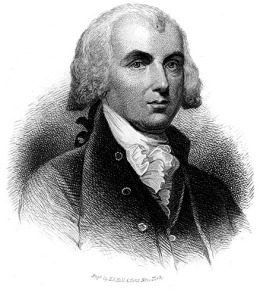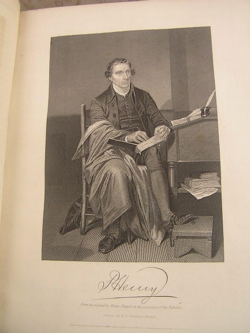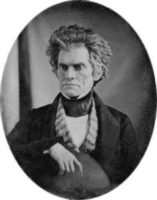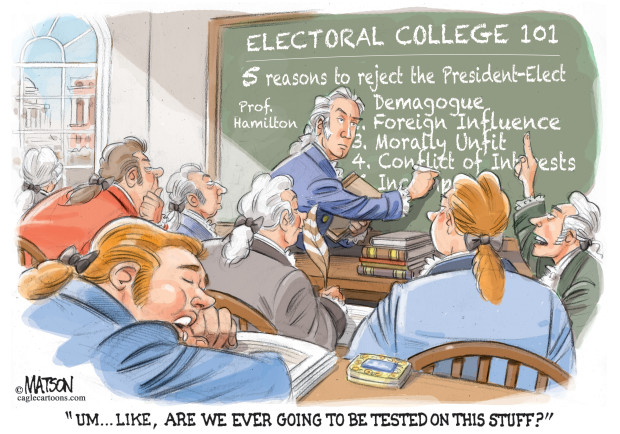 Sometimes I regret doing anything after I get home from work, as often my mind gets stimulated and I find myself unable to sleep. Last night was one such night as I laid in bed most of the night with a whole slew of thoughts running through my mind.
Sometimes I regret doing anything after I get home from work, as often my mind gets stimulated and I find myself unable to sleep. Last night was one such night as I laid in bed most of the night with a whole slew of thoughts running through my mind.
It all began when I posted the first paragraph from Luther Martin’s Genuine Information #3 on Facebook, asking how many people would spend any amount of time reading things like that. However, the avalanche of thoughts began when I got home from work and read the following comment made by someone on my friends list: This sounds like he was against the electoral college in as much as one individual person equals one vote opposite that is contrary to the human heart. Mostly because I equal the smallest state as does each and every human.
Now I’m not saying that what I’m about to say is either right or wrong, I’m merely sharing with ya’ll some of the things that keep me awake at night thinking. Hopefully it will stimulate some thought in your minds as well.
The 2020 Presidential Election is just 9 short months away and already I’ve heard some people discussing who they think will win, or how they will vote; thinking that it is actually their vote that chooses the president. I guess they have forgotten, or don’t know how the election of a president actually works.
Yes, in November the people will go to the polls and cast their votes for who will become the next president, but it is the Electoral College that actually chooses who will become the next president; and it often does not match the outcome of the popular vote.
How the formation of an Electoral College came into being is something I’m still hoping to learn more about, but how it works and why it supposedly was established is something I am somewhat familiar with.
First of all, the total number of Electors is based upon how each State is represented in Congress; with each State being given a specific number of Electors based upon how many seats they hold in the House of Representatives, plus 2 more for the number of Senators for each State. For instance, my home State of California has 53 Congressional Districts, plus the two Senators; so California is assigned 55 Electors. How these electors are chosen, and how they are required to vote in a presidential election is up to each State to decide.
Most States have a winner take all approach to assigning Electors to chose the next president; with I believe, Maine and Nebraska being the only two States that designate Electors on a proportional basis. What this means is that if the Republican Candidate gets 51% of the popular vote, then all 55 of California’s Electors go to the Republican candidate for president; although they are not required by law to cast their vote according to the outcome of the popular vote.
Prior to November each State is required to choose its potential electors; and this is where it gets a bit confusing. Each political party within a State nominates a complete slate of potential Electors; totaling the number of Electors assigned to that State. So in effect there are 110 potential Electors for the State of California; 55 on the Republican side and 55 on the Democratic side; and the electors for the side that wins the popular vote are the ones who then go on to represent California in choosing the next president.
Now I’ve heard a lot of discussion over the effectiveness of the Electoral College; both for and against its continuation. Some say it gives the more populous States an undo advantage in choosing the president, while others say it does not effectively represent the will of the people, due to the fact that the winner of the popular vote gets ALL the Electors for most States.
I’m not here to argue either side of that discussion, rather I’d like to talk about the idea of whether the people, either directly or indirectly, electing a president is consistent with a federal form of government, and how the larger States have a much louder voice in the process of choosing who will become president.
I hear people use the terms federal and national in reference to the government located in Washington D.C. I’ve also heard people talk about our ‘nation’ then in the same sentence reference the ‘federal’ government. I have come to believe that most people think that federal and national are one and the same; interchangeable, or synonymous. Well they aren’t; they are two distinctly different entities, and if we are to discuss the Electoral College we must have a rudimentary understanding of the difference between the two.
I could spend the remainder of this article discussing the intricacies of federalism versus nationalism, but for the sake of brevity I’ll try to keep this as short as possible. A federal form of government is one which was created by, and representative of, sovereign political entities, while a national form of government is one which was established for a single political entity; representing the people living within that entity.
Before the Constitution was ratified America had a truly federal form of government; one which was both created by, and representative of the States as sovereign political entities. Under the system established by the Articles of Confederation the people did not choose who to send to Congress, their State Legislatures did; therefore the Congress represented the States, not the people.
However, the State governments were national in form, in that those who comprised them were chosen directly by the people and the laws they enacted directly affected the people as well. In essence, the States were nations unto themselves, each with a national form of government, while at the same time they had agreed to enter into a confederation under a federal form of government that would act as a representative body for and upon the States.
Even so, this federal form of government established by the Articles of Confederation was not supreme, it was limited in that it could only offer suggestions, or recommendations to the States for their consideration; and for any proposal to become binding it would have to be agreed to by a unanimous vote of each State’s Legislature. Therefore, one State could effectively block the passage of a measure that had been approved of by the remainder of the Union if it felt the measure was detrimental to its or its people’s interests.
This requirement for unanimity and this jealousy towards State authority was a major stumbling block for those who felt that the central government should assume more power; effectively reducing the States to subordinate entities under its jurisdiction. Now whether those who felt that way were right or wrong is the topic for another day’s discussion, but it is for that reason that the delegates to the Philadelphia Convention chose not to amend the federal system; rather they chose to abolish it and try to establish a more national system, as outlined by the constitution the produced.
Now if you recall my brief explanation of federal and national forms of government you will find that what those attending the Philadelphia Convention sought to do was to bypass, or circumvent, the States and create a system that could directly act upon the people living within them; thereby effectively subordinating the States by the creation of a ‘nation.’
It’s ironic really, because those who proposed this fundamental change in our system of government were acting on behalf of their respective States; yet at the same time they were working to undermine the authority of those who gave them their delegated authority in the first place. It could almost be said that the attendees to the Philadelphia Convention were committing treason against their States by seeking to undermine and weaken their sovereignty and authority to manage their own internal affairs according to the will of the people living within them.
Over the course of my studies my attitude towards the constitution, and those who framed it, has changed dramatically. I no longer view the Constitution as this miraculous document that was written by inspired men; rather I believe it was the tool by which tyranny was introduced into American politics, and it was written by bad and evil men who sought power over the people of this country.
How does all this tie in to the Electoral College? Well, if you’ll hold onto your horses for a minute I’ll explain how it ties in.

James Madison
Very little is available in regards to what went on behind the closed doors of the Philadelphia State House during the deliberations that produced the Constitution; the doors were kept locked and the delegates were sworn to secrecy for a period of 50 years. James Madison took extensive notes during the convention, however during the period after it’s adjournment he constantly updated, or modified them so as to paint himself in a better light according to whatever political winds might be blowing across America; so they cannot be considered 100% accurate in their recording of the events that transpired behind closed doors.
Yet there was one man who was a delegate to that convention who understood that he had been sent there on behalf of his State, and the people thereof, who chose to break that code of silence and openly discuss what went on behind closed doors. This man, in a letter to the Citizens of Maryland, explained his reasons for violating that oath of secrecy as follows, “To you, my fellow-citizens, I hold myself in a particular manner ac-countable for every part of my conduct in the exercise of a trust reposed in me by you, and should consider myself highly culpable if I was to withhold from you any information in my possession, the knowledge of which may be material to enable you to form a right judgment on questions wherein the happiness of yourselves and your posterity are involved.”
That is what I call integrity; understanding the trust that was placed upon him, and doing what was right regardless of the wishes and desires of conspirators who sought to undermine State authority and place the people under the control and jurisdiction of a system of government of their own creation. That man’s name is Luther Martin.
Martin’s letters to the Citizens of Maryland, along with his Genuine Information, crack open the veil of secrecy the delegates were sworn to and give us a glimpse into the inner workings of that body of conspirators, and the evil of their machinations.
Regardless of what source you go to for an understanding of how our Constitution came into being, it is generally accepted by all that their efforts almost came to naught over the matter of representation in Congress.
Prior to the Constitution the Congress was the only body representing the Confederation. The Constitution changed all that by creating a bicameral legislative branch; meaning it has two houses that must both agree upon a law before it can be sent to the president for his approval. But it was the representation in these two houses of Congress that almost caused the convention to come to a screeching halt.
There were some, and I won’t mention any names for the time being, who felt that representation in both houses of Congress should be based upon the population of the States they represented. Therefore, the larger States, such as Pennsylvania, Virginia and Massachusetts would be better represented in both the Senate and the House of Representatives than would tiny Rhode Island or New Jersey or Connecticut.
This went against the whole concept of the federation, or federal form they already had, in that it abolished the one State one vote principle and gave the larger States a much louder voice in the making of laws, and would enable them to join up and enact laws that were harmful to the smaller States. Of course, this didn’t sit well with those smaller States and they offered their own alternative plan for representation. Of course that plan didn’t sit well with the larger States, and the standoff almost led to the dissolution of the convention.
Finally a compromise was reached in which the States would be equally represented in the Senate, but the representation in the House would be based upon the size and population of the States. This is one of those wonderful checks and balances we are taught about in school; no proposal can become law without the concurrence of the representatives of the people and the representatives of the States. Yet, since the ratification of the 17th Amendment took away a State’s ability to choose its members in the Senate, and gave that power directly to the people, it could be said that those who favored unequal representation got what they wanted after all; it only took 126 years for them to get it.
The question I’m hoping you’re asking yourself now is, did those who drafted the Constitution establish a federal system of government or a national one? Remember, a federal government represents the component parts of a confederation, or the States, and a national one represents the people. Therefore, is ours one or the other, a combination of the two, or a stepping stone by which we would eventually transform from a federal one to a fully national one?
Both those who supported the Constitution and those who opposed it had their own thoughts on the matter, and I’ll share them with you so that you can weigh both arguments and decide for yourselves whether you think our system is national or federal.
The most articulate arguments in support of the Constitution are found in the essays published by James Madison, Alexander Hamilton, and John Jay under the pseudonym Publius; commonly known as the Federalist Papers. Unfortunately though, the best explanation as to whether our system is federal or national is rather lengthy, being found in Federalist #39, written by James Madison. However, I hope you will take the time to read through what Madison says, and ponder it with the degree of thought the subject matter deserves.
Madison states, “‘But it was not sufficient,’ say the adversaries of the proposed Constitution, ‘for the convention to adhere to the republican form. They ought, with equal care, to have preserved the FEDERAL form, which regards the Union as a CONFEDERACY of sovereign states; instead of which, they have framed a NATIONAL government, which regards the Union as a CONSOLIDATION of the States.’ [Which was a direct jab at Patrick Henry] And it is asked by what authority this bold and radical innovation was undertaken? The handle which has been made of this objection requires that it should be examined with some precision.”
He then shows us how politicians are capable of speaking out of both sides of their mouth at the same time by saying, “On examining the first relation, it appears, on one hand, that the Constitution is to be founded on the assent and ratification of the people of America, given by deputies elected for the special purpose; but, on the other, that this assent and ratification is to be given by the people, not as individuals composing one entire nation, but as composing the distinct and independent States to which they respectively belong. It is to be the assent and ratification of the several States, derived from the supreme authority in each State, the authority of the people themselves. The act, therefore, establishing the Constitution, will not be a NATIONAL, but a FEDERAL act.”
Madison then goes into a lengthy explanation of how it is both federal and national at the same time, ” That it will be a federal and not a national act, as these terms are understood by the objectors; the act of the people, as forming so many independent States, not as forming one aggregate nation, is obvious from this single consideration, that it is to result neither from the decision of a MAJORITY of the people of the Union, nor from that of a MAJORITY of the States. It must result from the UNANIMOUS assent of the several States that are parties to it, differing no otherwise from their ordinary assent than in its being expressed, not by the legislative authority, but by that of the people themselves. Were the people regarded in this transaction as forming one nation, the will of the majority of the whole people of the United States would bind the minority, in the same manner as the majority in each State must bind the minority; and the will of the majority must be determined either by a comparison of the individual votes, or by considering the will of the majority of the States as evidence of the will of a majority of the people of the United States. Neither of these rules have been adopted. Each State, in ratifying the Constitution, is considered as a sovereign body, independent of all others, and only to be bound by its own voluntary act. In this relation, then, the new Constitution will, if established, be a FEDERAL, and not a NATIONAL constitution.
The next relation is, to the sources from which the ordinary powers of government are to be derived. The House of Representatives will derive its powers from the people of America; and the people will be represented in the same proportion, and on the same principle, as they are in the legislature of a particular State. So far the government is NATIONAL, not FEDERAL. The Senate, on the other hand, will derive its powers from the States, as political and coequal societies; and these will be represented on the principle of equality in the Senate, as they now are in the existing Congress. So far the government is FEDERAL, not NATIONAL. The executive power will be derived from a very compound source. The immediate election of the President is to be made by the States in their political characters. The votes allotted to them are in a compound ratio, which considers them partly as distinct and coequal societies, partly as unequal members of the same society. The eventual election, again, is to be made by that branch of the legislature which consists of the national representatives; but in this particular act they are to be thrown into the form of individual delegations, from so many distinct and coequal bodies politic. From this aspect of the government it appears to be of a mixed character, presenting at least as many FEDERAL as NATIONAL features.
The difference between a federal and national government, as it relates to the OPERATION OF THE GOVERNMENT, is supposed to consist in this, that in the former the powers operate on the political bodies composing the Confederacy, in their political capacities; in the latter, on the individual citizens composing the nation, in their individual capacities. On trying the Constitution by this criterion, it falls under the NATIONAL, not the FEDERAL character; though perhaps not so completely as has been understood. In several cases, and particularly in the trial of controversies to which States may be parties, they must be viewed and proceeded against in their collective and political capacities only. So far the national countenance of the government on this side seems to be disfigured by a few federal features. But this blemish is perhaps unavoidable in any plan; and the operation of the government on the people, in their individual capacities, in its ordinary and most essential proceedings, may, on the whole, designate it, in this relation, a NATIONAL government.
But if the government be national with regard to the OPERATION of its powers, it changes its aspect again when we contemplate it in relation to the EXTENT of its powers. The idea of a national government involves in it, not only an authority over the individual citizens, but an indefinite supremacy over all persons and things, so far as they are objects of lawful government. Among a people consolidated into one nation, this supremacy is completely vested in the national legislature. Among communities united for particular purposes, it is vested partly in the general and partly in the municipal legislatures. In the former case, all local authorities are subordinate to the supreme; and may be controlled, directed, or abolished by it at pleasure. In the latter, the local or municipal authorities form distinct and independent portions of the supremacy, no more subject, within their respective spheres, to the general authority, than the general authority is subject to them, within its own sphere. In this relation, then, the proposed government cannot be deemed a NATIONAL one; since its jurisdiction extends to certain enumerated objects only, and leaves to the several States a residuary and inviolable sovereignty over all other objects. [Which we all know is utter bullshit!]”
Madison then concludes with typical political doublespeak by saying, “The proposed Constitution, therefore, is, in strictness, neither a national nor a federal Constitution, but a composition of both. In its foundation it is federal, not national; in the sources from which the ordinary powers of the government are drawn, it is partly federal and partly national; in the operation of these powers, it is national, not federal; in the extent of them, again, it is federal, not national; and, finally, in the authoritative mode of introducing amendments, it is neither wholly federal nor wholly national.”
Now let’s see what the opponents of the Constitution had to say.

Patrick Henry
Patrick Henry, the man who told King George to either give him liberty or give him death, vehemently opposed the Constitution. Henry was offered a position in the convention that produced it; quite possibly as a means of silencing any opposition he might have for the finished document; for Madison was certain that Henry would oppose his plans and felt that if Henry were to participate in the process of abolishing the Confederation he would be less likely to speak out against the finished document. However, Henry saw through the subterfuge, proclaiming that he smelled a rat in Philadelphia; in reference to what the delegates were attempting to do.
On June 4, 1788, during the Virginia Ratifying Debates, Henry fired the first salvo across the bow of the nationalists who wrote the Constitution, saying, “I have the highest veneration of those Gentleman,— but, Sir, give me leave to demand, what right had they to say, We, the People? My political curiosity, exclusive of my anxious solicitude for the public welfare, leads me to ask who authorized them to speak the language of , We, the People, instead of We, the States? States are the characteristics, and the soul of the confederation. If the States be not the agents of this compact, it must be one of great consolidated National Government of the people of all the States.”
Remember, a federal form of government only acts upon the States, not the people. So why produce a system of government by the will of the people if it was not to affect them directly; meaning be a national form of government instead of a federal one.
Then there is that man of integrity I mentioned earlier, Luther Martin, who brought into play the topic of the unequal representation in the proposed system of government, “Suppose a confederation of States had never been adopted, but every State had remained absolutely in its independent situation, no person could, with propriety, say that the citizen of the large State was not as important as the citizen of the smaller, the confederation of the States cannot alter the case. It was said that in all transactions between State and State, the freedom, independence, importance and consequence, even the individuality of each citizen of the different States, might with propriety be said to be swallowed up, or concentrated in the independence, the freedom and the individuality of the State of which they are citizens—That the Thirteen States are thirteen distinct political individual existences as to each other; that the federal government is or ought to be a government over these thirteen political individual existences, which form the members of that government—and that as the largest State is only a single individual of this government, it ought to have only one vote—the smallest State also being one individual member of this government, ought also to have one vote.”

John C. Calhoun
Years later Senator John C. Calhoun would write, in his Discourse on the Constitution and Government of the United States, “”It is federal, because it is the government of States united in a political union, in contradistinction to a government of individuals, that is, by what is usually called, a social compact. To express it more concisely, it is federal and not national because it is the government of a community of States, and not the government of a single State or Nation.”
Then of course there is Thomas Jefferson, who expressed his belief that the system was federal due to the fact that, ” The several states composing the United States of America are not united on the principle of unlimited submission to their general government; but.by a compact under the style and title of a Constitution for the United States, and of amendments thereto, they constituted a general government for special purposes [and] delegated to that government certain definite powers. and. whensoever the general government assumes undelegated powers, its acts are unauthoritative, void, and of no force. To this compact each state acceded as a state, and is an integral party, its co-states forming, as to itself, the other party.The government created by this compact was not made the exclusive or final judge of the extent of the powers delegated to itself, since that would have made its discretion, and not the Constitution the measure of its powers.” (Source: Kentucky Resolutions)
Then again we return to Madison and his political flip flopping, who said, “[T]his Assembly doth explicitly and peremptorily declare, that it views the powers of the Federal Government, as resulting from the compact, to which the States are parties, as limited by the plain sense and intention of the instrument constituting the compact as no further valid than they are authorized by the grants enumerated in that compact; and that in case of a deliberate, palpable and dangerous exercise of other powers, not granted by the said compact, the States who are parties thereto, have the right, and are duty bound, to interpose, for arresting the progress of the evil, and for maintaining within their respective limits, the authorities, rights and liberties appertaining to them.”
I now leave it up to you to decide whether you, individually, think that our system was established to be federal, national, a combination of the two, or a means by which federalism could be abolished and replaced with nationalism.
But, if it is a federal system, then why are the people even involved in choosing members to this system of government? If it is federal, then it can only act upon the States, not the people directly; which means the States should be the sole deciders as to who holds the seats of power within it; not the people. The people already have their governments, and they are found in the various State capitals; and if this system is federal, then the States, as single political entities, should be the ones to choose those who sit in the seats of power in the federal system…unless of course it isn’t federal, rather it is national as Henry said on June 5, 1788, “I rose yesterday to ask a question which arose in my own mind. When I asked that question, I thought the meaning of my interrogation was obvious: The fate of this question and of America may depend on this: Have they said, we, the States? Have they made a proposal of a compact between states? If they had, this would be a confederation: It is otherwise most clearly a consolidated government. The question turns, Sir, on that poor little thing-the expression, We, the people, instead of the States, of America.”
While I may have inserted my own thoughts into this, it was primarily written to get you to think for yourselves; all I have done is provide certain historical facts that you may not have known, and asked you to weigh both sides of the argument and come to your own conclusion.
Now, it’s time I tie all that I have said into the Electoral College.

If our government truly is federal, the people should play no role in choosing the president; either by popular vote or by means of choosing electors to vote on their behalf. I know that sounds radical, especially among those who become enthralled with the idea of participating in the process of choosing who will become the next president, but I ask that you confine yourself to the limits set by the question of whether our system is federal or national.
Also, if it is federal, then let us recall what Luther Martin said, that each State should get one vote. Why then does California get 55 votes, while Wyoming, South Dakota, North Dakota, and Montana only get 3 electoral votes? If it is federal, then why does one State get 18 times more electoral votes than those held by the aforementioned States?
As it stands now, under our existing system, the vote is typically tabulated based upon whether a State is red or blue; with the Red States voting predominantly Republican and the Blue States voting predominantly Democrat. Elections are therefore determined based upon a few ‘Swing States’ and it is there that the candidates focus a lot of their time and attention; at the total disregard of those who may be undecided in a red or blue State; as their outcome is usually predictable.
That means our elections are usually based upon the partisan leanings of the more populous States, along with how the Swing States decide to vote. That is purely national in form, for the States are excluded from the process entirely. If we truly had a federal form of government the people themselves would be excluded from participating in the choosing of a president; it would be done by the State Legislatures; with each State getting a single vote, and the winner would be the one who got a majority of the votes. Now whether that majority be a simple 51%, or a 3/4 majority would be up to those who decided such things.
But as it stands now, our system is not federal, it is national. The people choose the president, the members to both the House and the Senate, and the States are excluded from both the process and the ability to participate in what laws the government enacts; which is exactly what most of those opposing the ratification of the Constitution feared would happen to the States should the Constitution be adopted and put into operation.
Like I said, I have my own thoughts on this, all I’m trying to do is to get you to think a bit more than you typically do when it comes to the nature of your system of government and what you expect it to do for you. If you truly understood federalism, and how it provides a better defense against your rights and liberties, you would not be as enthusiastic as you are about choosing who becomes the next president; as you would realize that under a federal form of government it is not your place to do so.
I’m not asking you to agree with me; although that would be a nice bonus. All I’m asking you to do is think about what I’ve said. Is that too much to ask of you?
February 11, 2020

~ The Author ~
Neal Ross, Student of history, politics, patriot and staunch supporter of the 2nd Amendment. Send all comments to: bonsai@syix.com.
If you liked Neal’s latest column, maybe you’ll like his latest booklet: The Civil War: (The Truth You Have Not Been Told). Life continues to expand for this prolific writer and guardian of TRUE American history.
